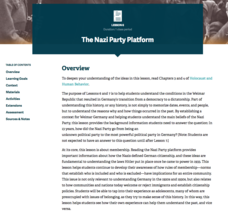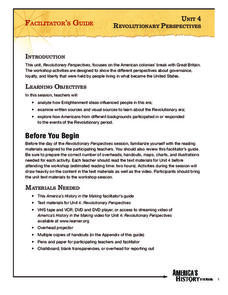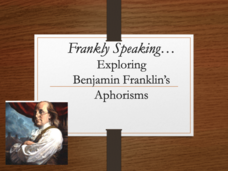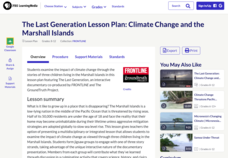Council for Economic Education
The Columbian Exchange
What did you have for dinner last night? Many scholars ask that question without considering the history behind the foods they eat. Using a simulation, scholars investigate how the foods they eat are the product of the Columbian...
Council for Economic Education
What's the Big Deal about Spices?
Today's gourmands don't consider spices to be the equivalent of silver and gold. During the middle ages, however, these commodities were precious. People back then used spices in religious ceremonies, to cure rotten food, and as a show...
Council for Economic Education
The Economic System of Medieval Europe
How are economics and politics intertwined? Societies in the Medieval period used feudalism for both economic and military reasons. The arrangement provided safety and met other needs. Using the included simulation, individuals...
Council for Economic Education
Economic Systems of the Incas and Aztecs
The Inca and Aztecs created vast economic empires in South America, but how did economics play a role? A simulation activity and reading help scholars evaluate the kinds of markets these great civilizations created. They then consider...
Council for Economic Education
Fall of Rome
What led to the fall of Rome? Scholars have debated the question since the end of the great empire. Young historians consider the same question through an economic lens using an engaging lesson that involves a hands-on evaluation of the...
Council for Economic Education
The Silk Road
The Silk Road connected the European, Middle Eastern, and Asian worlds. It also helped create the modern trade world. An analysis activity makes the importance of this Chinese innovation clear by asking participants to evaluate trades...
Council for Economic Education
The Neolithic Agricultural Revolution
What effect could one person's invention have on the human race? In the case of the Neolithic Agricultural Revolution, small improvements in farming methods led to increased food production. The human population began to boom, leading us...
Council for Economic Education
How Neolithic Farmers Increased Their Standard of Living
How do people improve their economic situations? While many learners may not consider questions about how many crops to grow in ancient times were economic decisions, a hands-on activity encourages individuals to make these connections....
Facing History and Ourselves
The Nazi Party Platform
Not all party platforms stay democratic. A resource covers many political issues in Germany during the time of World War II, and teaches pupils about the Nazi party platform and what went wrong. Individuals participate in a warm-up...
Annenberg Foundation
Antebellum Reform
Scholars investigate the Antebellum period in the United States in an engaging lesson. Groups analyze technological, religious, economic, and social changes occurring during the time period prior to the Civil War. Using their new...
Annenberg Foundation
Revolutionary Perspectives
Life, liberty, and the pursuit of happiness. Learners go to the heart of the causes of the American Revolution. Examining political cartoons, Enlightenment documents, and firsthand accounts, they present their ideas and reflective...
Annenberg Foundation
Colonial Designs
The adventures of the New World came at a cost for Native Americans. Scholars investigate the economic side of settling the European colonies. Using video clips, statistical evidence, and primary sources, they create hypotheses and...
PBS
Using Primary Sources: Wide Open Town
A picture speaks a thousand words, no matter how old! Scholars use political cartoons from the era of Prohibition and the Temperance Movement to analyze what, a primary document (in this case, a bootlegger's notebook) is telling them...
Council for Economic Education
Christopher Columbus, Entrepreneur? Queen Isabella, Venture Capitalist?
What did it take to embark on a journey to unknown lands? Perhaps ambition, but also money! Christopher Columbus had to approach more than one European monarch for financing before he could sail the ocean blue. A read-along play and...
Council for Economic Education
Why Didn't China Discover the New World?
Who was Zheng He and why haven't we heard of him? Scholars consider the question as they compare his vast expeditionary force to that of Christopher Columbus. Young historians then ponder the intersection of science, economics, and...
Council for Economic Education
Business in the Middle Ages: Working in a Guild
Long before modern labor unions, guilds worked to ensure that workers had a fair wage. But, in medieval Europe, they also cooperated with the government. Using a simulation and primary source analysis, young scholars become hatters in...
Council for Economic Education
Wages and the Black Death
While the Black Death wiped out a third of Europe's population during the Middle Ages, its destruction paved the way for better wages for workers and even an early form of modern capitalism. The relationship between the cataclysmic event...
Council for Economic Education
Athens and Sparta-Imagine the Possibilities
Both Athens and Sparta made choices to survive in ancient Greece. Those choices were, in essence, economic ones about how to direct resources. A Venn diagram activity and reading ask class members to examine the connection between...
Council for Economic Education
Entrepreneurs in Mesopotamia
While ancient Mesopotamia didn't have the TV show "Shark Tank," it was a time of entrepreneurship as workers began to specialize. Both individual workers and the societal structure encouraged individuals to consider how they could...
Council for Economic Education
Great Civilizations Develop around Rivers
If you lived in prehistoric times, what kinds of choices could your family make to increase their chance of survival? By making similar decisions in a simulation game, participants discover how specialization creates both opportunity and...
Chandler Unified School District
Frankly Speaking: Exploring Benjamin Franklin's Aphorisms
Benjamin Franklin famously had an aphorism for every situation—most of which we still use in modern vernacular. Introduce class members to Franklin's Poor Richard's Almanack with a presentation that details the characteristics of aphorisms.
PBS
The Last Generation: Climate Change and the Marshall Islands
Are some families down to their last generation? The final segment of a two-part climate change series investigates the vanishing Marshall Islands. Scholars divide into research teams to analyze three different individuals whose lives...
PBS
The Last Generation
How does climate impact the town, city, or area where people live? Scholars research the concept of climate change as it pertains to the Marshall Islands. The opening lesson of a two-part series uses interactive online resources and...
Ashbrook Center at Ashland University
Ratification of the Constitution
How difficult was it to get everyone to agree on the contents of the Constitution? Historians analyze the task of the Founding Fathers in creating the United States Constitution. They research a directory of video clips, primary sources,...

























